Imelda Marcos, Back On the Warpath
By Stephen Brookes • Insight • May 13, 1991
__________________________________________________________________________
After five years of lawsuits, five years of bad press, five years of exile in the United States and five years of shoe jokes, Imelda Marcos is fed up -- and she's kicking back.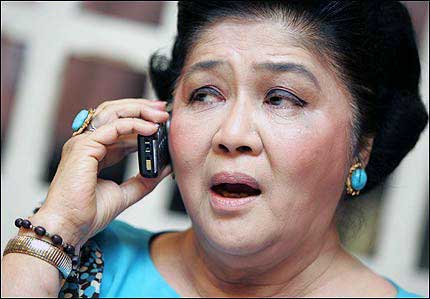 Acquitted last July in a federal court in New York City on charges that she stole $222 million from her country, the widow of Philippine dictator Ferdinand Marcos is demanding the right to go home, bury her husband and seek vindication in Manila. Her lawyers have launched a bare-knuckle offensive to get her back in time for next year’s elections, and they're daring President Corazon Aquino to try to stop them.
Acquitted last July in a federal court in New York City on charges that she stole $222 million from her country, the widow of Philippine dictator Ferdinand Marcos is demanding the right to go home, bury her husband and seek vindication in Manila. Her lawyers have launched a bare-knuckle offensive to get her back in time for next year’s elections, and they're daring President Corazon Aquino to try to stop them.
For Aquino, the "housewife president" who rose to power in the popular revolution of 1986, the signs are a little ominous. She's being pressured to file criminal charges in Manila against Marcos by the end of the year, in a case that she's likely to lose. And with her longtime nemesis vindicated and on the prowl, Aquino could be forced, like it or not, to face Marcos down in a two-woman catfight for the presidency next year. In the Philippines, where politics is a blood sport, knives are already sharpening for the War of the Widows.
Marcos herself seems confident, even a little cocky, about heading into what may be the fight of her life. "We have been victims of this vindictiveness, this hate campaign," she says, waving a soft and perfectly manicured fist in the air. "But we are coming to be on the side of what is right!"
In an interview last month in her flower-filled suite at the Madison Hotel in Washington, Imelda Romualdez Marcos talked for several hours about her life, her travails and her coming vindication. She slips easily in and out of various roles as she talks: the bereaved widow, the persecuted victim, the woman of destiny, the poor little rich girl, the whiny parvenue and the philosopher queen. Dressed immaculately in black, with discreet touches of gold at her ears and a tiny Philippines flag pin glinting on her shoulder, she's filled out a little around the gills but is still, at 61, trim, elegant, a beauty.
She's also an indefatigable talker who sleeps only a few hours a night, and though she has a tendency to ramble -- semi-thoughts on love, air force bases and motherhood tumble out in a vague muddle -- she doesn't cry in public anymore, as she did during the tense weeks of her trial last summer. She even cracks jokes, sort of: "Oh yes,” she tells the photographer as he positions her for a portrait, "my husband used to say that cameramen were the real dictators!" But when the talk turns to the lawsuits against her, to Aquino and to the future of her country, the deep brown eyes turn steely and sharp, and the voice takes on a sudden edge.
Admire or despise her, Imelda Marcos has toughed out five years of public scorn. She's a survivor. For two decades she and her husband wielded absolute power over the Philippines, plunging the country crazily into debt to fund an orgy of spending that dazzled, and later disgusted, the entire world.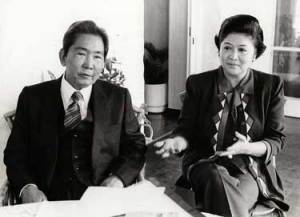
Ferdinanad and Imelda, in better daysThey were a brilliant couple: as Ferdinand practiced the politics of intrigue and patronage, Imelda shopped, and shopped, and shopped, and shopped.
But everything began to collapse in 1983, when popular opposition leader Benigno Aquino was shot down as he returned from exile. Aquino's murder set off a mounting wave of anti-Marcos sentiment that exploded in February 1986, when hundreds of thousands of people massed in the streets. Marcos's own generals turned against him, putting Aquino's widow, Corazon, into Malacanang Palace. With the crowd hard on their heels, the Marcoses fled in panic to Hawaii.
For Ferdinand and Imelda, it was a bitter comeuppance. One of Aquino's first acts was to open the presidential palace to the public, displaying Imelda's fabled collection of shoes (more than 1,000 pairs) and bras (300 of them, all black, all identical). Aquino mounted a string of lawsuits against the Marcoses in New York, California, Hawaii, Canada, Britain, Hong Kong and Switzerland, and set up a special task force to track down the $10 billion allegedly stolen by Marcos and his cronies during their years in power.
But after Ferdinand Marcos died in Hawaii in September 1989, the search for the missing money began to falter, and the centerpiece of Aquino's legal attack on Imelda Marcos -- the charges of fraud and racketeering brought in New York -- backfired wildly, leaving a triumphant Marcos cleared of all charges.
Suddenly, the tide seemed to be turning in her favor. Leaving the courtroom after the verdict, one juror accused the government of "harassing this poor woman:' and the judge in the case said in disgust that he didn't understand why it had even been brought. From the venal, overdressed parasite she had been portrayed as, Marcos found herself transformed overnight into something more to her liking: an innocent victim of persecution.
The acquittal reinforced her determination to get back to Manila. But that won't be a cakewalk for Marcos. There's the money problem, for one thing: Identified Marcos assets around the world are frozen under a civil suit Aquino is pressing in Los Angeles, and Marcos has to account to the government anytime she spends more than $10,000. Moreover, she can't leave the United States because of a hold-departure order issued by the Justice Department -- in fact, she can't even leave New York without giving 48 hours' notice.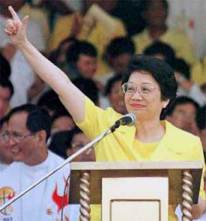
Cory AquinoBut the biggest hurdle is getting her government to grant her a passport -- and that Aquino has adamantly refused to do, on the grounds that Marcos poses a threat to national security.
Since the acquittal, however, pressure has been mounting for Aquino to back down: Few of her advisers believe that Marcos could mount a successful coup, and the polls say that most Filipinos think it only decent to let her come home and bury her husband.
The Philippine Senate, the House of Representatives and the chief of staff all agree that it's perfectly safe to let Marcos come home. Even Gen. Rodolfo Biazon, the head of the armed forces, agrees: "If the army is asked whether Imelda will pose a direct security threat to our nation,” he said in a radio interview, "my answer is no."
But the kicker came in December, when the Swiss Supreme Court ruled it would not turn over $350 million in sequestered Marcos accounts unless Aquino filed criminal charges in the Philippines by the end of 1991 -- and let Marcos return to defend herself.
That forced Aquino's hand, and in late March she finally caved in. "Imelda Marcos will be issued a passport when we have finalized the criminal charges against her," she conceded -- while acknowledging that the government still wasn't quite sure what to charge her with, or when.
With the scent of blood in her nostrils, Marcos immediately moved to throw Aquino even further off balance. She filed a suit in Manila against Foreign Secretary Raul Manglapus and two other officials in early April, asking for $3.57 million in damages for the "mental torture" she suffered in exile, and a few days later petitioned a Manila court to order Aquino to return her passport to her. "There is absolutely no legal or justifiable reason for preventing her return at any time," argued her lawyers, "even before the institution of any criminal case.” She's not stopping there: The lawyers also plan to plead her case before Amnesty International and the United Nations. In Manila, meanwhile, a coalition of pro-Marcos groups has been circulating a petition to bring her home: They claim to have garnered 2 million signatures so far.
Cory Aquino might be excused for being a bit skittish; only a few months ago she warned publicly that letting Marcos back in would allow her to "mobilize the underground network of the Marcos dictatorship, which is designed to overthrow this government and endanger our democratic aims and economic momentum." That's strong language. But it's widely suspected that Marcos money was behind at least a few of the seven coup attempts that Aquino has weathered in the past five years -- including the most serious one in December 1989, when rebels held Manila's central Makati district for six days.
Since then, the military has rounded up many of its top renegade plotters: Eight have been captured in the past few months alone (the latest, Capt. Edgardo Divina, was picked up in April as he was distracted by a local beauty contest). But rogue ex-military figures with close ties to the Marcos regime still roam the countryside, occasionally showing up at military bases to stir up coup fever. Their numbers are small, their funds are limited, and their influence is thin. But there are some who would kill to bring back a Marcos regime, and that's what keeps Aquino up nights.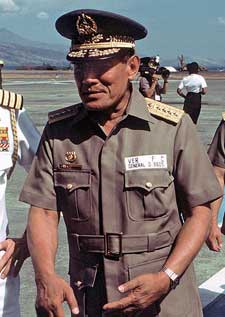
Fabian VerTake, for example, former Gen. Jose Maria "Jimmy" Zumel, the head of Imelda's bodyguard detail for several years. Zumel’s loyalty to his boss was rewarded with a promotion to air force general and superintendent of the military academy. He's now hiding somewhere in the Philippines, diplomatic sources confirm.
Then there's Gen. Fabian Ver, Ferdinand Marcos's former military chief of staff, right-hand man and onetime suspect in Benigno Aquino's murder. No one knows where Ver is now, nor ex-Col. Gregorio "Gringo" Honasan, the leader of the rebellious Reform the Armed. Forces Movement and one of the suspected brains behind the December 1989 coup attempt.
If Imelda Marcos does return, though, it's unlikely she'd bother fomenting a coup with a scurrilous pack like Zumel, Honasan and Ver. She's developed a certain subtlety during her years in exile (the result, perhaps, of discovering she had become one of the world's most reviled public figures), and her plan now seems to be to first humiliate Aquino, then ease her way back into public life. She doesn't need to win the presidency to do that, but she does have to win her case in a Manila court.
"More than life," she says intently, "I value vindication." Can she get it? Tough to predict, but Justice Secretary Franklin Drilon admitted in April that the government has something less than an airtight case. In five years not a single criminal charge has been lodged against Imelda Marcos in Manila, and the task force Aquino set up to investigate her, the Presidential Commission on Good Government, has been sputtering along lamely for years. Its head, David Castro (himself the object of a Marcos lawsuit), has promised that charges will be finalized in June, but politics will determine the timetable. As one experienced diplomat in Manila says, "Cory Aquino would rather have Marcos back later than sooner."
If that reflects a certain lack of confidence, it should. The Filipino system of justice is modeled on the American one, and there's no reason to think that a trial in Manila would have any more success than the fiasco in New York, when the government produced 350,000 documents, 95 witnesses and still couldn't make a convincing case.
"We couldn't convict her just because she had money," says Alan Belofsky, a New York mailman who served as a juror in that case. "I mean, a lot of the evidence was about her husband, not her. And a lot of the information made no sense. I don't know if any other jury will understand it any better than we did." An acquittal seems likely -- an acquittal that would gall Aquino and turn Marcos's return into nothing less than a triumph.
It would also mean that Marcos could keep her fortune intact. The presidential commission has recovered only about $455 million of what it estimates to be $10 billion in Marcos cash, real estate and art, and morale in the group is dropping fast. "It's very difficult to put together a paper trail,” says Maria Teresa Roxas, head of the PCGG's New York office. "A lot of the evidence that we've accumulated is from documents that were left behind. Because (the Marcoses) made a mistake, we were able to put together some sort of paper trail. But they haven't made many mistakes."
Still reeling from its loss in New York, the PCGG got another blow in December with the Swiss Supreme Court ruling. Besides calling for Aquino to file charges in Manila, the Swiss added insult to injury, reserving the right to review the trial. If they think Marcos was unfairly convicted, they say they'll ignore the court's decision.
And as if things weren't bad enough, commission head David Castro blundered again last month when he offered to drop the civil racketeering and graft charges in Los Angeles if Marcos would turn over some $200 million in her accounts in Hong Kong. No sooner was the offer made public than Philippine Solicitor General Francisco Chavez denounced it as "a betrayal of the moral crusade which is expected of this government." Marcos jerked the hapless Castro around for a while before walking away from the deal -- laughing, as they say, all the way to the bank.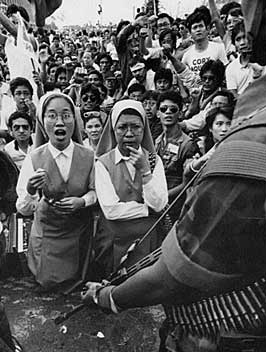
The Philippines during the "People Power" revolutionMoreover, disturbing tales are filtering out of the rocky island of Leyte in the central Philippines, where a group of bounty hunters broke into the Marcos family mausoleum in search of gold -- and did it under Castro's orders. Work was cut off in mid-April after the diggers were fired on by unidentified assailants, but not before the bones of Marcos's parents had been dug up, pawed through and left on the ground.
Castro has gone on record as saying he had been told about the vaults by a witness who had seen them being built, and while he had no indication that there was any gold in them, he thought he might as well investigate. Under the deal, the government would get 60 percent of anything recovered; the diggers could keep the rest.
In her suite in Washington, Marcos turns bitter and a little distraught as she looks through photographs of the desecration, just mailed to her from Leyte. "All I can say is that [Castro] is very tough to talk to,” she says sharply. "He has direct conversation with the Blessed Mother! He had a revelation from the Blessed Mother that there was gold in my family tombs, in the graves of my father and my mother and my family, so they trampled upon the sacred graves of the dead. This is the thing -- he's hearing instructions, and this is the head of the PCGG." She leafs quietly through a few more of the pictures. "It's a very unusual situation."
If she can face Aquino down in the courtroom, Marcos's next job will be to position herself as either candidate or eminence grise to a less controversial figure. She won't reveal her plans, but both supporters and detractors are convinced she has her eye on the top prize. "There's no secret about her ambitions,” snorts the PCGG's Roxas. "She wants to be president!”
Imelda herself is coy. "My hopes," she demurs, "are not for the presidency." She pauses, letting her eyes moisten. "But as a mother, as a woman, when your children -- your people -- need help, need love, need food, need employment, it doesn't matter if you are not a doctor. As a mother, you will find a doctor. Even if you are not a farmer, you will find a farmer to produce the food for your children. So my role right now is beyond ambition and beyond the presidency. I just want to go home, to mother a people who need help."
Marcos may have trouble selling that pitch to her putative children. She's been known as many things: the Rose of Tacloban (from her beauty queen days), the Muse of Manila (for singing "Feelings" at cocktail parties) and the Philippine Evita (or ‘Superma'm,’ as her staff is said to have called her). She's been a member of Congress, governor of Manila and, more recently, accused thief. But now: Mother Imelda?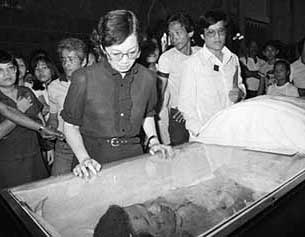
The assassination of Bengino Aquino led to the Marcos' downfallStill, she might just bring it off. The Marcos name has more clout than any other in the Philippines, though it's hard to judge just how much people are willing to forgive and forget.
"She certainly has a large number of friends and supporters,” says a Western diplomat in Manila. "They were in charge for a long, long time. Her return would have a large impact and would raise a lot of emotion. But whether that would translate into political influence beyond what she has now with the network of friends, relatives and money that supports her is hard to say." Another experienced observer is more blunt: "There's a certain amount of self-delusion in her own mind about how popular she is.”
Deluded or not, Imelda herself is unfettered by doubt. "Oh, definitely," she says, waving a confident hand in the air, when asked if her image has changed. "The truth is starting to prevail; all the propaganda is now being shown as false." Maybe, although a survey conducted in Manila after her trial found that 69 percent of the population still thought the graft and corruption charges against her were based in fact. But there's sympathy, too: Fully 64 percent say she ought to be allowed to return home.
"She's pretty low as far as voter preference goes for president,” says Mahar Mangahas, head of the polling group Social Weather Stations in Manila. "There are at least 10 people in front of her. People may feel that she should be shown more compassion perhaps, but I don't think that will change voter preference."
Of course, when you're as rich as Imelda Marcos, voter preference is whatever you want it to be. It's reliably estimated to cost about $40 million to run a campaign in the Philippines, and with high levels of unemployment, the vote buying in the next election could reach epidemic proportions. "The rent-a-crowd phenomenon used week after week by the Marcoses in the late 1970s to generate support is still a possibility," notes James Clad, a Philippines expert at the Carnegie Endowment for International Peace in Washington.
That's one reason why at least five of the leading candidates (according to one Marcos lawyer) are actively courting her support and endorsement. She's coy about whom she likes: "I've said time and time again that I would help the candidate wanted by the people." Pressed on whether any of the candidates are particularly outstanding, she smiles sweetly and says, "I will have to check."
Marcos, of course, is hoping that the people will want her. To that end, she's been busily cultivating the image of a born-again democrat: "Vox populi, vox dei" has become one of her favorite expressions. Floating happily above the fray, she's careful to avoid seeming too pushy, or too interested. But she's quick to remind anyone who asks that she is, in fact, available for the job. "If the people speak, the leader follows," she says. "And in this case, if the people speak, Imelda follows. Only then must one consider a draft for the presidency."
The Philippines that Marcos wants to lead is, in plain words, a mess. Between fighting off the periodic coup attempts, Aquino has had to contend with a 22-year-old communist rebellion, a $28 billion foreign debt, double-digit inflation and widespread unemployment. Economic growth is expected to slow to a deathly 2 percent this year. Aquino's response? She proclaimed the week of April 14 as "Positive Thinking Week,” saying that "positive thinking brings one closer to the ideals of truth, beauty and happiness.”
In all fairness, Cory Aquino has accomplished some remarkable things, not least being the restoration of democracy. But her critics charge that corruption is still rampant, costing the country more than $4.5 billion a year, and that bureaucratic inefficiencies and government mismanagement are hampering growth. The transportation system doesn't work, electricity frequently goes out, the phone system is unreliable, and the garbage often goes uncollected. As basic services collapse, disillusion with the "people power" movement is growing, and as Aquino herself once observed, "liberty is a poor substitute for food."
Marcos refuses to be drawn out on the subject of Aquino's leadership. "A strong leadership based on vindictiveness or negativism will bring further negativism,” she says, with all the neutrality she can muster. But it's clear that she would welcome a match; and while Aquino told supporters recently that "not even an Imelda could make me run again," an actual Marcos candidacy would probably change her mind.
Aquino could hardly be blamed for running from a showdown. The strong bosses and big money families that have traditionally run Filipino politics don't much like her, and the fight could get bruising. As one Filipino paper noted recently, "Elections in the Philippines are the ultimate exercise in vote-buying, tampering, cheating, terrorism and brutality -- and the time to even the score."
That hasn't discouraged a gaggle of would-be candidates (dubbed "the presidentiables" by the press) from preening for the race. If Aquino does drop out, she's expected to give her blessing to Speaker of the House Ramon V. "Monching" Mitra Jr. But Defense Secretary Fidel "Eddie" Ramos, the general who quashed the coup attempts against Aquino, also wants her endorsement and could run as a candidate of the newly formed United People's Power Movement if he doesn't get it.
In the opposition Nacionalista Party, the fight for the nomination is on between Juan "Johnny" Ponce Enrile and Salvador "Doy" Laurel (both longtime associates of Marcos's), though polls suggest neither has much widespread support.
Out on the fringes are a few others: Senate President Jovito "Jovy" Salonga; Executive Secretary Oscar Orbos; Sen. Joseph "Erap" Estrada; former Cabinet member Miriam Defensor Santiago -- and maybe even Ferdinand "Bongbong" Marcos Jr.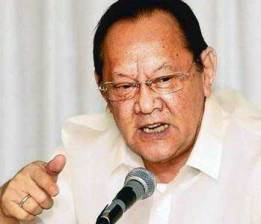
Eduardo "Dandang" CojuangoBut the most intriguing, the most powerful and certainly the richest is Eduardo "Danding" Cojuangco, a multimillionaire who rose to prominence through his long association with Ferdinand Marcos. Cojuangco (who, as it happens, is Cory Aquino's first cousin) made millions running a string of businesses during the Marcos regime and was so close to the ruling family that he left with them in 1986 -- only to return under still-unexplained circumstances just before the December 1989 coup attempt.
Cojuangco has been pressing the flesh and passing out favors in recent months, testing the waters for a campaign. He's launched a new group called the Filipino Party and armed it with a huge war chest. Known as a sophisticated and capable businessman, Cojuangco is said to understand the politics of patronage better than anyone. But many of his assets have been seized by the Aquino government because of his association with Marcos, and now he wants them back. "No one is really sure if Cojuangco wants to run,” says another Western diplomat, "or if he's getting ready to support someone who would free him from this web of sequestrations that hamper his business empire."
When the campaign officially opens next year, the field will have boiled down to just a few contenders. Until Marcos makes up her mind whether to be among them, going head-to-head with Aquino, or supporting Cojuangco or another ally from behind the scenes, she's happy to file lawsuits against Aquino's government and play the innocent. "I would rather someone else became president," she says. "I would have more freedom and more credibility. But destiny is something you cannot argue with.”

